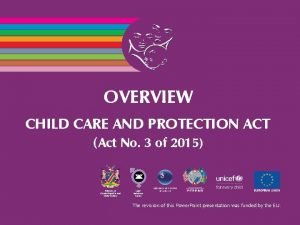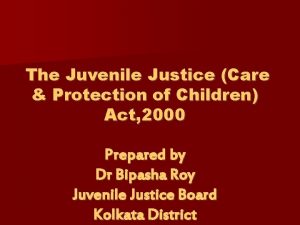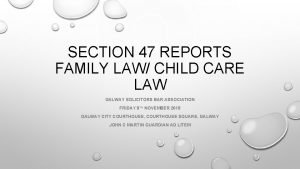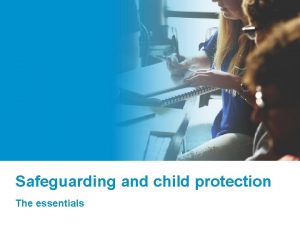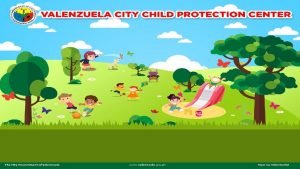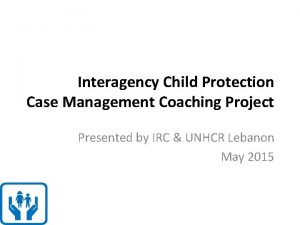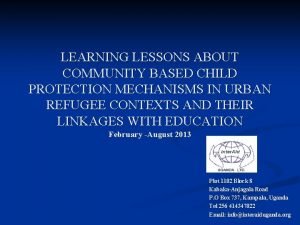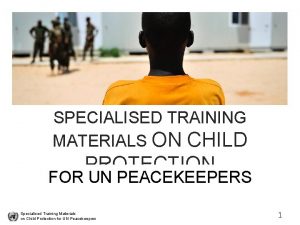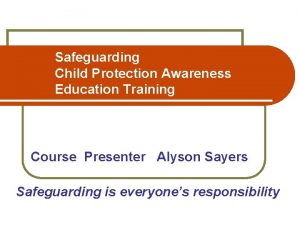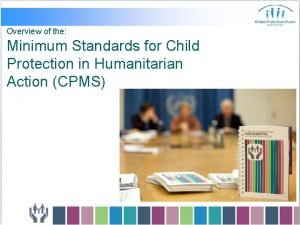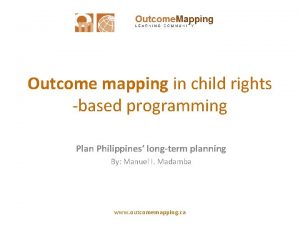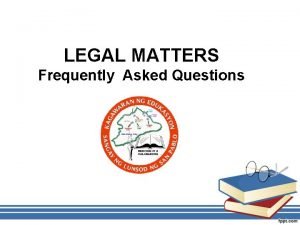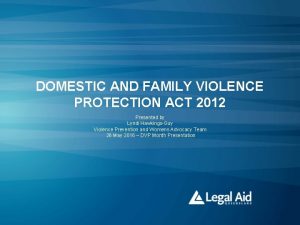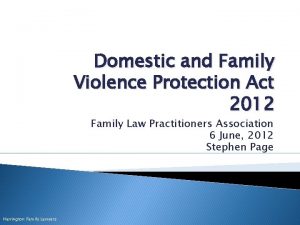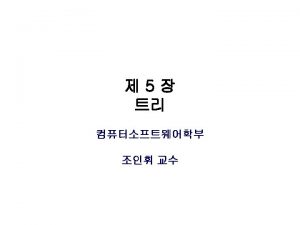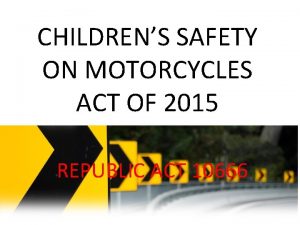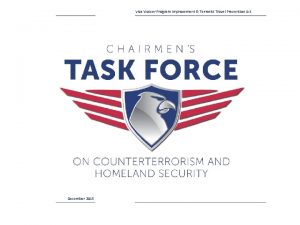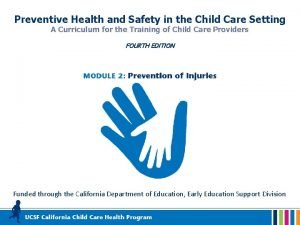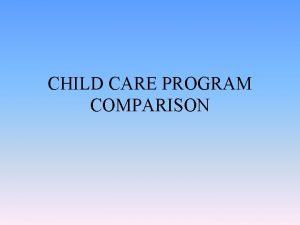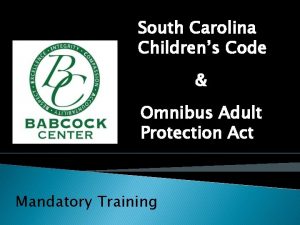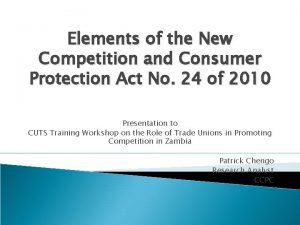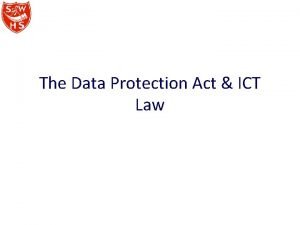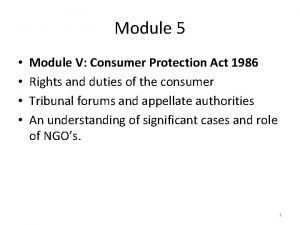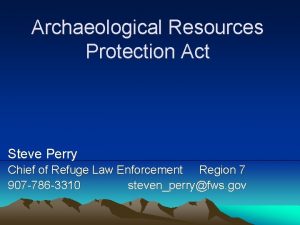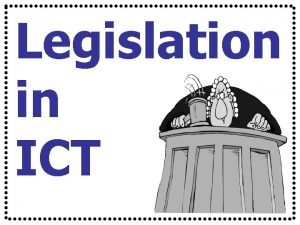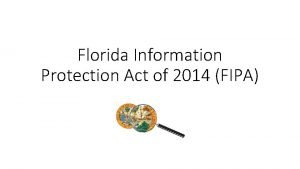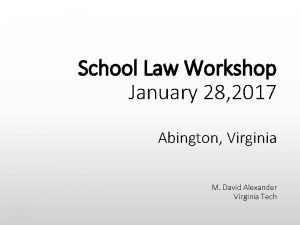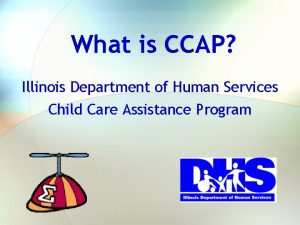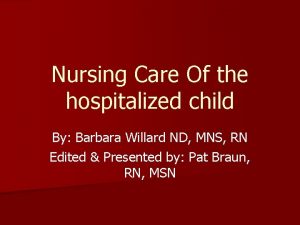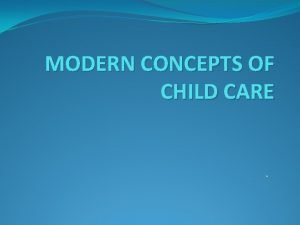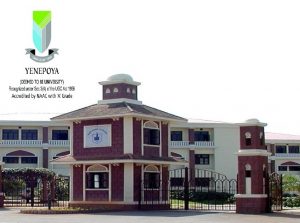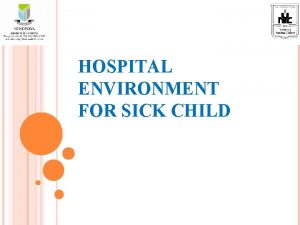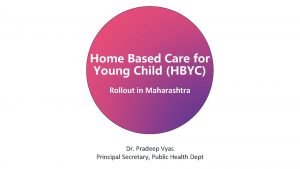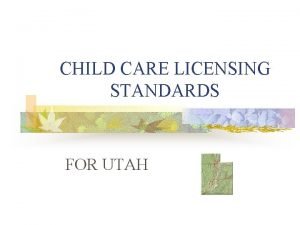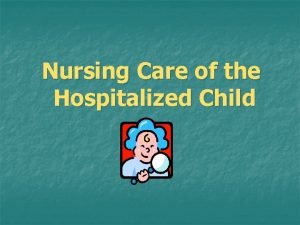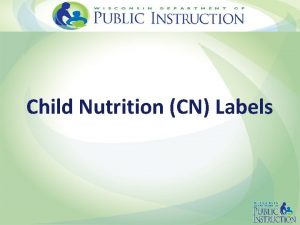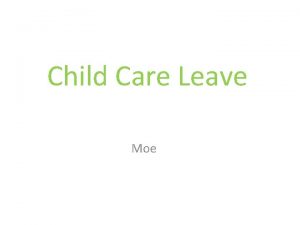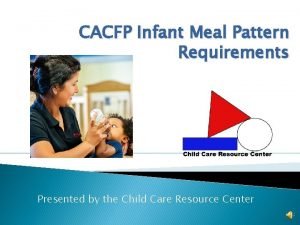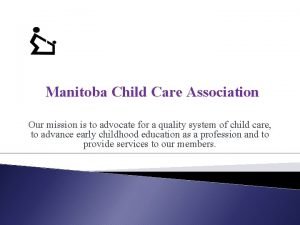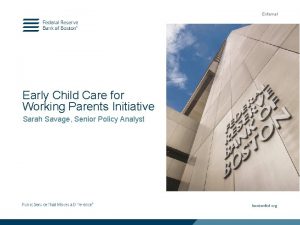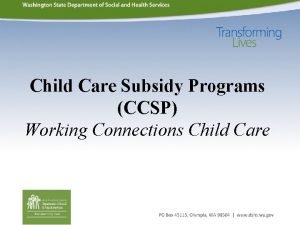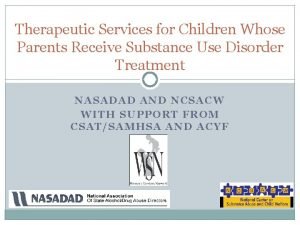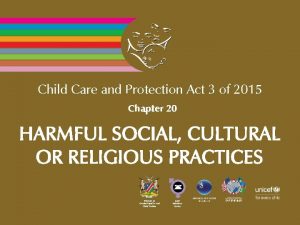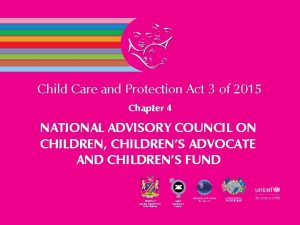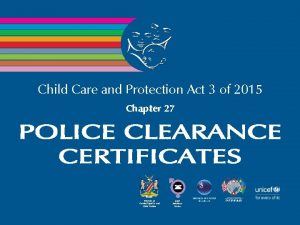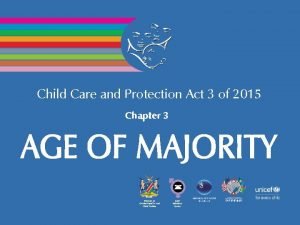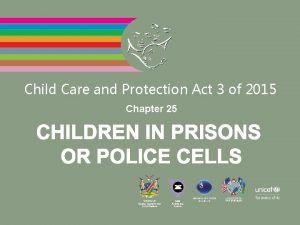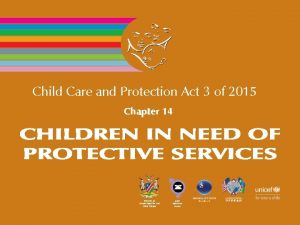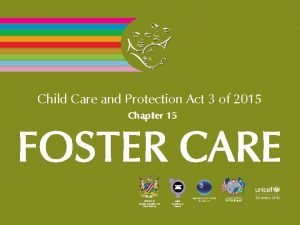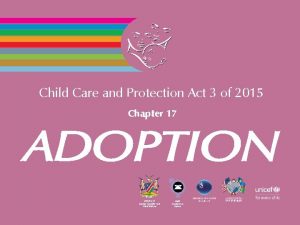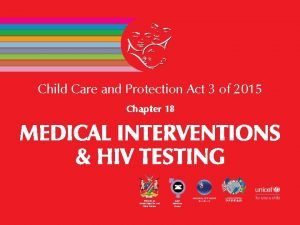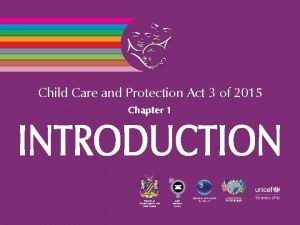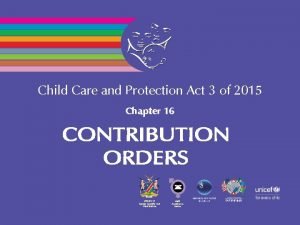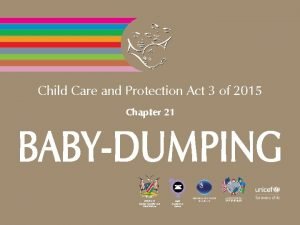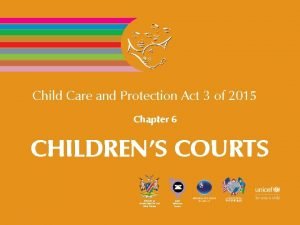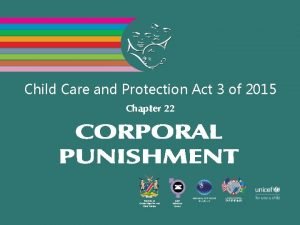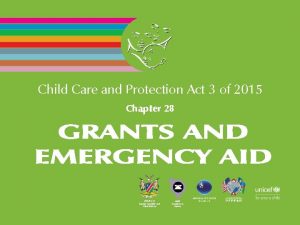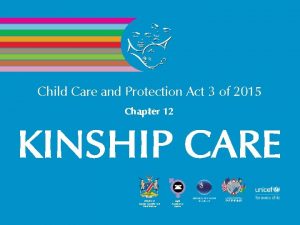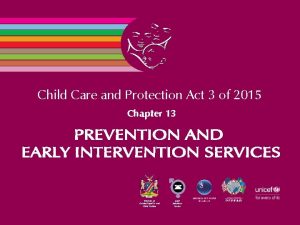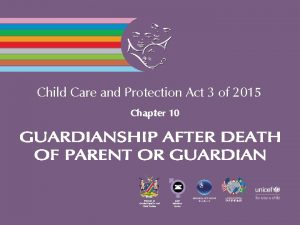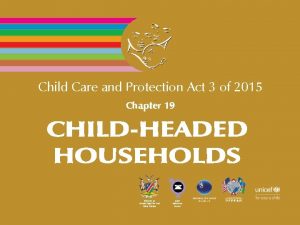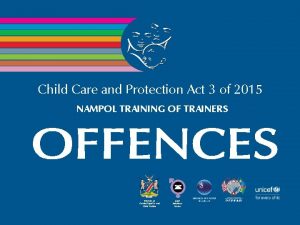Child Care and Protection Act 3 of 2015




























































- Slides: 60

Child Care and Protection Act 3 of 2015 Chapter 9 Ministry of Gender Equality and Child Welfare Legal Assistance Centre

Overview l The Child Care and Protection Act removes discrimination against children born outside marriage. l The Act addresses three important aspects of parental responsibilities and rights: custody, guardianship & access. l It provides simple procedures for allocating these rights where children are born outside marriage, including procedures for — o changing custody or guardianship o stopping or restricting access o enforcing a right of reasonable access. l These procedures are also available todivorced parents and to married parents who are living apart.

l The Act contains rules about maintenance and inheritance which put children born outside marriage on an equal footing with children born inside marriage. l It also contains rules about children born through assisted reproductive techniques which make use of donated sperm or ova. l These provisions repeat the repealed Children’s Status Act 6 of 2006 , with some refinements.

PART 1 CHILDREN BORN OUTSIDE MARRIAGE

1. Key concepts Custody Guardianship Access Responsibility for the day-to-day care of the child, including the power to make decisions about that care. Capacity to make important legal decisions for the child (signing contracts, bringing court cases, administering property) Person with custody = custodian Person with guardianship = guardian Contact with the child (visiting child, taking child on trips, phone calls, texts, letters) “Guardianship” can have both a narrow and a broad meaning. The broad term “guardianship” includes custody if there is no other legal custodian for the child.

2. Constitutional & international framework Namibian Constitution, Article 15(1): Children shall have … subject to legislation enacted in the best interests of children, as far as possible the right to know and be cared for by their parents. African Charter on the Rights and Welfare of the Child, Article 19(2): Every child who is separated from one or both parents shall have the right to maintain personal relations and direct contact with both parents on a regular basis

Convention on the Rights of the Child Article 7(1): The child shall … have the right … as far as possible, the right to know and be cared for by his or her parents. Article 9(3): States Parties shall respect the right of the child who is separated from one or both parents to maintain personal relations and direct contact with both parents on a regular basis, except if it is contrary to the child’s best interests. Article 18(1): States Parties shall use their best efforts to ensure recognition of the principle that both parents have common responsibilities for the upbringing and development of the child. Parents or, as the case may be, legal guardians have the primary responsibility for the upbringing and development of the child. The best interests of the child will be their basic concern.

3. Old and new rules Old law: o In the past, there were no scientific tests to prove paternity, so children born outside marriage were considered to be related only to their mothers. o The mother had custody and guardianship rightsand the father had no rights over the child. The child could not inherit from the father without a will. Children’s Status Act 6 of 2006: This statute applied new rules designed to remove discrimination against children born outside marriage, and between mothers and fathers of these children. Child Care and Protection Act: This statute replaced the Children’s Status Act to ensure harmony on issues such as — o child participation o legal representation for children o vulnerable witness provisions o factors for assessing a child’s best interests.

Summary: Custody

Summary: Guardianship

Summary: Access

Summary: Maintenance

Summary: Inheritance

Factors to assess child’s best interests Right to know & be cared for by both parents Child’s age, majority & mental capacity Relationship of child with other persons Difficulty of maintaining contact with parents Child’s sex & background Parents’ attitude towards child Impact of any disability or chronic illness Personal characteristics Capacity of parents to provide for child’s need Importance of stable family environment Physical & emotional security Desirability of keeping siblings together Need to protect child from harm Intellectual, social & other development Likely effect on child of changes Need to minimise legal procedures Child’s views in light of age & maturity Connections to extended family & culture Any other relevant factors

Additional factors to consider Degree of commitment & responsibility each parent has shown towards the child Respective financial positions of parents, BUT this factor is not decisive on its own Right of child to know & be cared for by both parents Goal of resolving disputes in a non-adversarial manner if possible The court must not approve an application for custody that is motivated by an attempt to avoid paying maintenance for the child.

Child participation l Child’s view must be given due consideration IF child is of sufficient age and maturity to express a view. l Every child has the right to choose not to participate, after being given sufficient information and advice to make an informed decision on participation.

4. Custody 1) The parents of a child born outside marriage can make a written agreement that makes one of them the child’s custodian. 2) If the parents cannot agree, they can ask the children’s court to decide. 3) If they do NOT make an agreement or approach the children’s court, the common-law rule applies by default(the mother is the child’s custodian and guardian).


Making a custody agreement A custody agreement between parents of a child born outside marriage must be — o in writing o signed by both parents o signed by two witnesses. Parents who make a custody agreement might also want to make a parenting plan. o A parenting plan contains details about the exercise of parental responsibilities and rights. For example, it might identify decisions that the parents agree to consult each other about, or set a schedule for visits by the non-custodian parent. Parents can NOT make a kinship care agreement with each other. A kinship care agreement is an agreement between a person who has parental responsibilities and a person who does not. It temporarily delegates parental responsibilities, but it cannot transfer them.

Both parent have equal rights to be a child’s custodian.

Registering a custody agreement Why register a custody agreement? • to provide proof of legal powers of custody • to prove eligibility to apply for or receive a State grant One or both of the parents may submit the agreement to the clerk of the children’s court for registration. Both parents must indicate a wish to have the agreement registered. • They can submit the agreement to the clerk together. • One parent can submit the agreement to the clerk along with a written request for registration signed by both parents. Registration is OPTIONAL. There is no specific procedure for amending a custody agreement. But if parents agree to change a registered agreement, they should register the amended agreement also to prevent confusion.

Who can apply for a custody order? The following persons can apply for a court order on custody of a child: l child’s father l child’s mother l child’s care-giver l someone else acting in the best interests of the child. Minor parents: A minor who is the mother or the father of a child can bring an application for custody independently, without help from his or her own parent or guardian. An application for custody will normally be brought by the person seeking custody. If it is made by someone else, the children’s court may grant an order for custody only after hearing directly from the person seeking to be the custodian.

Procedure Notice: The court will notify persons who have an interest in the application, to invite their input: o child’s parents o child’s care-giver o other persons identified by court or social worker. Social worker report: The court must order a social worker to prepare a report on the child’s situation. Other investigations and evidence: The court may summon any witnesses and order any other investigation that it considers necessary. Remember the principle of child participation!

Procedure (continued) Child protection: If it appears to a children’s court that the child before it may be in need of protective services, the proceedings must be converted into a child protection hearing. Custody order: The children’s court may issue a order giving — o sole custody to either parent o joint custody to both parents o sole custody /joint custody to other persons. Appeals: Any party may appeal to the High Court.

Joint custody l Married parents automatically have joint custody of the children born to them both. l The Act provides for joint custody by unmarried parents only by means of a court order – and not by private agreement between the parents. l A children’s court may grant joint custody to divorced parents only if they can show that circumstances have changed since the divorce order was granted. This prevents misuse of a children’s court to “appeal” a High Court divorce order. Both parents are fit to take care of the child Both desire continuous contact Factors to consider Both are able to promote child’s best interests Both parents are sources of emotional support The parents live close to each other

Unlawful removal or detention

5. Guardianship l Guardianship normally goes with custody for parents of children born outside marriage. Custodian = Guardian unless court order says otherwise l The court can separate custody and guardianship, by making one person the custodian and another person the guardian. l The court may also decide to name more than one person to share guardianship powers.

Minor parents If a child’s parent is a minor, the guardian of the minor parent is the guardian of the minor parent’s child.

Removing a child from Namibia No matter who is the guardian of a child born outside marriage, both parents must give consent for a child to travel outside Namibia (regardless of the intended time period of the trip). Exceptions: o parent cannot be found after the required efforts have been made (but the regulations do not specify what efforts are required) o parent cannot give valid consent due to mental incapacity o children’s court rules that requiring parental consent would not serve the child’s best interests. A children’s court also has the power to overrule a parent’s refusal to give consent to travel. Penalty: Unlawfully taking or send a child out of Namibia is punishable by a fine of up to N$50 000 or prison for up to 10 years, or both.

Giving a child up for adoption No matter who is the guardian of a child born outside marriage, both parents must consent to giving the child up for adoption. Exceptions: There a number of exceptions to this rule, especially for fathers of children born outside marriage — o who have not voluntarily acknowledged paternity o who have not been involved in the child’s life. The exceptions to this rule are explained in chapter 17.

Who can apply for a guardianship order? The following persons can apply for an order on guardianship of a child: l child’s father l child’s mother l child’s care-giver Minor parents (under age 18) cannot apply for guardianship. The minor parent’s own parent or guardian is the guardian of the minor parent’s child, unless a court order appoints another major to act as guardian. l someone else acting in the best interests of the child l person authorised by Minister to act on behalf of the child. The court procedure is the same as for custody.

Legal guardians as “tutors” l A legal guardian WHO IS NOT a natural guardian MAY NOT administer any property belonging to the child or make decisions about the child’s person UNLESS appointed by the Master of the High Court as a “tutor”. o A tutor may be required to post security with the Master in order to administer a child’s property. o The Master will normally give preference to a legal guardian to be named as a child’s tutor, but may appoint someone else if this is in the child’s best interests. l Who is a natural guardian? A person whose guardianship duties are imposed by law, without choice. o Married parents: Both parents are natural guardians. o Unmarried parents: Only the mother is a natural guardian.

Complaints about guardians & tutors Who can make a complaint: Any person who has a genuine interest in the well-being of the child. A complaint can be made anonymously. Notification: The clerk of the children’s court must notify the guardian or tutor and provide them with a copy of the complaint. Investigation: The court must order an investigation by a designated social worker. The court can subpoena anyone as a witness. Decision: The court can alter the appointment of guardianship. In the case of a tutor, the court must notify the Master of the High Court who may alter the tutorship.

Example

6. Access l Automatic access: If a child’s parents are not married, one parent will be custodian & guardian, and the other parent will have an automatic right of reasonable access. l In the past, unmarried fathers did not have access rights. Now the right to access is automatic for any father who has voluntarily acknowledged paternityby: making a written acknowledgment of paternity to the mother or the clerk of the court before the child is six months old voluntarily paying or offering to pay maintenance paying damages for the pregnancy under customary law being listed as the father on the child’s birth certificate

Access in terms of a court order Even if there was NO voluntary acknowledgement of paternity, a father can still apply to the children’s court for access rights. What if a child’s custodian is someone other than a parent? In such a case, both parents would be non-custodian parents. l The mother would have automatic access rights in terms of the common law. l The father would have either an automatic right of access (if he has voluntarily acknowledged paternity) or a right to apply to a children’s court for access.

Types of access orders Parent or interested person can ask court to restrict or deny access by a non-custodian parent if it is in the child’s best interest. Who can apply: o custodian parent o other custodian o child’s care-giver o other person acting in child’s best interest o person authorised by Minister Person with a right of access can ask court to enforce access if it is unreasonably denied or restricted. Who can apply: o non-custodian parent o any person who has a right of access to the child Unmarried father who has NOT voluntarily acknowledged paternity can request a court to grant a right of access. Who can apply: o parent who wishes to establish a right of access The court procedure is similar to the procedure for custody & guardianship.

Rules about access (1) Parent with access has no right to remove the child from the usual home without the custodian’s consent.

Rules about access (2) The right of access is subject to the reasonable control of the child’s custodian or the primary caretaker who has been entrusted with the care of the child by the custodian.

Emergency procedure for restricting or denying access l It is possible to get a temporary order restricting or denying access to a child IF there is a risk of immediate harm to the child. l Anyone who can apply for an order restricting or denying access can also use this emergency procedure. l This temporary order can be made without hearing the other parent’s side of the story and without notice to anyone else IF the court is convinced that this is necessary for the child’s safety. l The clerk will give notice of the temporary order to the parent with access right away. l The temporary order will be in force until the normal procedure for a court order restricting or denying access has run its course.

Example

Access by other family members Who is a family member (other than a parent)? l any other person who has parental responsibilities and rights in respect of the child l a grandparent, step-parent, brother, sister, uncle, aunt or cousin of the child l any other person with whom the child has developed a significant relationship resembling a family relationship

7. Inheritance Without a will: Children born outside marriage can inherit from their father’s estate even if there is no will. With a will: General words in a will like “children” or “issue” automatically include children born outside marriage, unless the will was clearly written with an intention to exclude them. Customary law: Children born outside marriage must be treated the same as children born inside marriage for purposes of inheritance. These rules are retroactive.

8. Maintenance l Children born inside and outside marriage must be treated the same when it comes to maintenance. l All children have a right to be maintained by both of their parents, and this duty extends to the immediate family members of both parents if necessary. l All children have a corresponding duty of support to both their parents (if they are in need and the child can provide), and this reciprocal duty also extends to the immediate family members of both parents. l All children have a right to claim maintenance from the estate of a deceased person who had a duty to support them.

Example

9. Domicile l Domicile is a legal concept which decides what law applies to cases involving people in different countries. l Parents and children do not always live together. So it is best for the domicile of a child to be considered separately from the domicile of the child’s parents. The domicile of a child is the place the child is most closely connected to.


10. When parents marry after their child’s birth l If the parents of a child are not married when the child is born but marry each other at some point after the birth of the child, the child will be treated as if the parents were married all along.

11. Children born as a result of rape l There are certain special rules that apply to situations where a child is conceived through rape. o It is rare but possible for a female rapist to become pregnant from a rape. Example: Where a female teacher has sex with a 13 -year-old boy, it is rape because of the age gap between them even if the boy agreed to have sex. If she became pregnant from this rape, the rules would apply to her. l A convicted rapist has NO automatic rights to custody, guardianship or access but could apply to court for such rights if this was somehow in the child’s best interests. l A rapist parent must contribute maintenance just like any other parent, but the child has NO reciprocal duty of support towards the rapist parent. l A child can inherit from a rapist parent in the same way that any other child born outside marriage but the rapist parent can NOT inherit from the child unless there is a will naming that parent as an heir. l A rapist father is NOT required to give consent to put the child up for adoption. l References to “parent” in the Act do NOT include the father of a child conceived through rape.

12. Children born as a result of incest l There are certain special rules that apply to situations where a child is conceived through incest. l The normal rules on custody, guardianship or access apply – because both parents might be guilty of incest, and the child should not be left without care. l The parent must contribute maintenance just like any other parent, but the child has NO reciprocal duty of support towards the parent who committed incest. l A child can inherit from a parent who committed incest in the same way that any other child born outside marriage but the parent who committed incest can NOT inherit from the child unless there is a will naming that parent as an heir. l References to “parent” in the Act do NOT include the father of a child conceived through incest.

PART 2 CHILDREN OF DIVORCED OR SEPARATED PARENTS

13. Divorced or separated parents l A divorce order from the High Court will usually cover custody, guardianship, access and child maintenance. Divorced parents can go to the children’s court o to make changes to these divorce order provisions if there are changed circumstances o to restrict or deny access to protect a child o to enforce access rights. l Married parents who are separatedcan also use the children’s court procedures if they have not yet filed for divorce.

Automatic review by High Court l If the children’s court changes a divorce order made by the High Court, a judge of the High Court must review this decision in chambers – even if none of the parties to the case have requested a review.

PART 3 CHILDREN OF VOID AND VOIDABLE MARRIAGES

14. Void and voidable marriages VOID A void marriage never existed because the requirements for a valid marriage were not met: The necessary marriage formalities were not followed. The parties are the same sex. One or both already married in a civil marriage. One or both under age 18. One or both parties mistaken about the nature of the ceremony or the identity of the other party. l One or both parties insane. l Parties so closely related that marriage is forbidden. l l l A void marriage is automatically invalid, but the High Court might issue a declaration confirming that it is void.

VOIDABLE A voidable marriage can be annulled (cancelled) by the High Court on the basis of some fraud or mistake: l One or both parties under 21 & married without parental consent. l One or both parties gave consent under duress. l Either spouse was at the time of the marriage permanently unable to have sexual intercourse for some physical reason and the other spouse did not know. l The wife was pregnant by another man at the time of the marriage and the husband did not know. l Either spouse knew at the time of the marriage that he or she was physically unable to procreate and the other spouse did not know. A voidable marriage becomes invalid only if it is annulled at the request of the wronged spouse. If both parties want to stay married, they can.

Children of void/voidable marriages l A child who is born to parents in a void marriage is in the same position as a child born outside marriage, because there never really was a marriage. o Where a child is born into a void marriage, any court dealing with the matter must enquire into the best interests of the child and make provision for safeguarding that child’s interests. l The status of a child born to parents in a voidable marriage will not be affected by the annulment of the marriage. o The child will NOT be a child “born outside marriage” even after the annulment. A court that annuls a voidable marriage must consider the best interests of the child in the same way as if the parents were getting a divorce.

PART 4 CHILDREN BORN OF ASSISTED REPRODUCTIVE TECHNIQUES

15. Children born of assisted reproductive techniques Where a child is conceived by means of a medical procedure involving donor eggs or sperm, the Act says that the woman who gives birth to a child and her husband will be the biological parents as long as they both gave consent to the procedure. l This changes the common law rule that made the parents the persons who provided the egg and the sperm.

Surrogacy l Surrogacy = an agreement between a woman and a commissioning parent where it is agreed that the woman will bear a child for the commissioning parent. o Surrogacy might be used by a married couple where the woman is unable to conceive or sustain a pregnancy. It might also be used by a single man or woman or a same-sex couple. l There is no legal framework for surrogacy in Namibia. This means that a surrogacy contract might not be enforceable in court if there was a dispute. *** The parents of a child born to a surrogate are the persons who supplied the egg and sperm. The parties might resort to adoption to adjust the situation.
 Child care and protection act 3 of 2015
Child care and protection act 3 of 2015 Children rights and responsibilities
Children rights and responsibilities Child protection and toy safety act
Child protection and toy safety act Child protection reform amendment act 2017
Child protection reform amendment act 2017 Juvenile act
Juvenile act Handling information in care settings
Handling information in care settings Section 47 reports
Section 47 reports Safeguarding and child protection the essentials
Safeguarding and child protection the essentials Primary secondary tertiary health care definition
Primary secondary tertiary health care definition Courage child protection
Courage child protection Types of child protection
Types of child protection Child marriage definition
Child marriage definition Child protection case management tools
Child protection case management tools Types of child protection
Types of child protection Professional curiosity munro
Professional curiosity munro Community based child protection mechanisms
Community based child protection mechanisms Child protection training materials
Child protection training materials Child protection awareness training
Child protection awareness training Child protection minimum standards
Child protection minimum standards Child protection policy example
Child protection policy example Affidavit of two disinterested person
Affidavit of two disinterested person Macbeth act 2 summary
Macbeth act 2 summary Domestic and family violence protection act 2012
Domestic and family violence protection act 2012 Domestic and family violence protection act 2012
Domestic and family violence protection act 2012 Left child right sibling tree
Left child right sibling tree What is the children’s safety on motorcycles act of 2015?
What is the children’s safety on motorcycles act of 2015? Terrorist travel prevention act
Terrorist travel prevention act Fiji companies act 2015
Fiji companies act 2015 Child care facility rules and regulations answers
Child care facility rules and regulations answers Preventive health and safety in the child care setting
Preventive health and safety in the child care setting Head start pros and cons
Head start pros and cons District forum in consumer protection act
District forum in consumer protection act Data protection act 1998 summary bbc bitesize
Data protection act 1998 summary bbc bitesize Omnibus adult protection act
Omnibus adult protection act Conclusion of consumer rights
Conclusion of consumer rights Data protection act teach ict
Data protection act teach ict Scope of consumer protection act 1986
Scope of consumer protection act 1986 Archaeological resources protection act of 1979
Archaeological resources protection act of 1979 Seller definition
Seller definition Right to be heard
Right to be heard A ___ resource cannot be remade once it is used.
A ___ resource cannot be remade once it is used. Data protection act ict
Data protection act ict Florida information protection act of 2014
Florida information protection act of 2014 Paul d coverdell teacher protection act
Paul d coverdell teacher protection act Child, youth and family services act, 2017
Child, youth and family services act, 2017 Ccr&r illinois calculator
Ccr&r illinois calculator Nursing care of hospitalized child
Nursing care of hospitalized child Modern concept of pediatrics
Modern concept of pediatrics Modern concept of child health nursing
Modern concept of child health nursing Hospital environment for sick child ppt
Hospital environment for sick child ppt Hbyc age limit
Hbyc age limit Utah daycare licensing
Utah daycare licensing Nursing care of hospitalized child
Nursing care of hospitalized child Cn labels for child care
Cn labels for child care Moe childcare leave
Moe childcare leave Child care resource center
Child care resource center Manitoba child care association
Manitoba child care association Trilemma of child care
Trilemma of child care Washington connections child care
Washington connections child care Wv dhhr child care assistance
Wv dhhr child care assistance Georgia child care licensing regulations
Georgia child care licensing regulations

